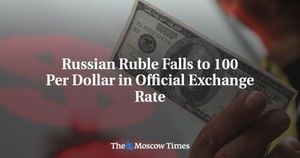The Indian stock market experienced another retreat on February 12, 2025, as both the BSE Sensex and Nifty50 indices opened lower, showcasing the persistent bearish trend affecting the market. The Sensex dropped significantly, settling at 75,751.09 with a decline of 543 points or 0.71%, and similarly, the Nifty50 fell to 22,918.35, down 153 points or 0.67%.
This market descent marked the fifth consecutive session of losses, driven largely by mounting concerns over newly imposed tariffs by the United States. On Monday, US President Donald Trump enacted drastic changes to trade policy, increasing tariffs on steel and aluminum imports from 10% to 25%, which negated prior country-specific exemptions. This move sparked fears of retaliatory actions from trading partners, particularly from the European Union, as the prospect of trade strain looms large over global markets.
According to analysts, the specter of inflation caused by the tariff hikes will likely lead to cautious monetary policy from the Federal Reserve, which has already hinted at no imminent rate cuts amid persistent inflationary pressures. Rajesh Sinha, Research Analyst at Bonanza, noted, "Negative sentiment was largely attributed to concerns surrounding US President Donald Trump's announcement of reciprocal tariffs on imports, including steel and aluminum, which sparked worries about potential trade conflicts and inflation." This shift has seen foreign institutional investors pulling out of Indian equities, offloading stocks worth ₹88,139 crore year-to-date, contributing to growing market instability.
With higher bond yields and a stronger dollar, investors are facing mounting pressure, particularly from the U.S. Treasury yield, which is currently at 4.55%. This dynamic has led to significant capital outflows from the Indian market as foreign investors seek more favorable conditions elsewhere. The Nifty Smallcap100 and Nifty Midcap100 indices have fallen nearly 20% from their all-time highs, nearing bear market territory.
On the sectoral front, the healthcare, real estate, and consumer durables sectors witnessed substantial declines. Mid and small-cap stocks faced even harsher selling pressure, exemplified by the Nifty Smallcap 50 declining by 2.31% and the Nifty Midcap 100 by 2.13%. A notable impact was felt within the Nifty Metal Midsmall Healthcare Index, which fell 1.12% as investor sentiment worsened.
Specific stocks also bore the brunt of the downturn, with Mahindra & Mahindra Ltd leading the losses among Sensex components, dropping 2.23%. ITC Ltd and Zomato Ltd followed close behind, with declines of 1.77% and 1.51%, respectively. The wide-ranging impact of these losses signals the depth of market concern as pervasive bearish sentiment continues to dominate.
Despite the downward trend, some analysts believe there may be room for recovery. Akshay Chinchalkar of Axis Securities commented, "The Nifty fell for the fifth straight session yesterday, the first time since December 2024. While the broader benchmarks are underperforming, the actual market condition reveals fewer than 10% of stocks are under their 100-day averages, indicating we may be nearing a rebound point. The risk remains high for recovery," he said.
Looking at the broader figures, investors are bracing for the impending U.S. consumer price index (CPI) data, which may have significant ramifications for market sentiment and future Federal Reserve policies. Given the mixed signals from global markets, the path forward for Indian equities remains clouded with uncertainty.
Overall, with markets reacting to global events, cautious trading and heightened scrutiny of corporate earnings are expected to continue influencing investor behavior. Experts will keep a close watch on how these dynamics evolve, particularly as PM Modi’s upcoming two-day visit to the U.S. holds potential for trade discussions. The markets anticipate meaningful dialogue which could alleviate tariff tensions—a ray of hope amid the present turmoil.



